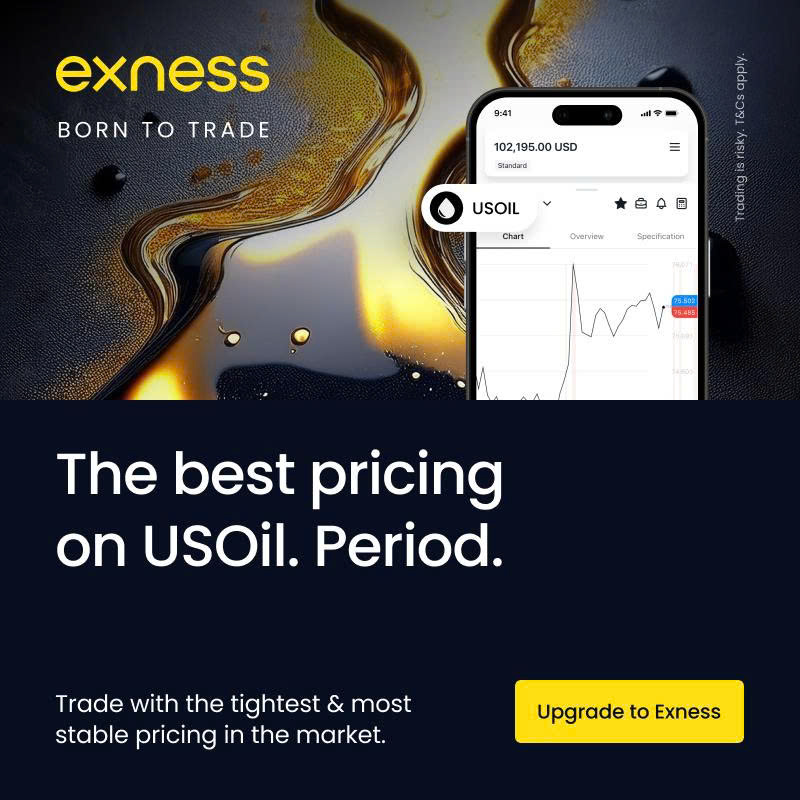
9 minute read
How to Start Forex Trading in Ethiopia: A Comprehensive Guide
Forex trading, or foreign exchange trading, is gaining momentum in Ethiopia as a viable avenue for financial growth. With the global forex market being the largest and most liquid financial market, boasting a daily trading volume exceeding $7.5 trillion, it offers immense opportunities for individuals looking to diversify their income streams. For Ethiopians, forex trading presents a unique chance to engage with global markets, capitalize on currency fluctuations, and achieve financial independence despite economic challenges like currency controls and limited local infrastructure. This guide provides a detailed, step-by-step approach to starting forex trading in Ethiopia, tailored for beginners, with practical tips to navigate the unique landscape of the Ethiopian market.
Top 4 Best Forex Brokers in Ethiopia
1️⃣ Exness: Open An Account or Visit Brokers 🏆
2️⃣ XM: Open An Account or Visit Brokers 💥
3️⃣ JustMarkets: Open An Account or Visit Brokers ✅
4️⃣ Quotex: Open An Account or Visit Brokers 🌐
Why Forex Trading in Ethiopia?
Ethiopia’s economy is transitioning toward a market-oriented system, with growing internet penetration and a young, tech-savvy population. Despite challenges like political instability and strict currency controls, forex trading is becoming increasingly popular for several reasons:
Accessibility: Forex trading requires only an internet connection, a device, and a modest initial investment, making it accessible to many Ethiopians.
Flexibility: The forex market operates 24 hours a day, five days a week, allowing traders to participate at convenient times.
Profit Potential: With proper strategies, traders can profit in both rising and falling markets.
Global Exposure: Forex trading connects Ethiopians to international markets, broadening investment opportunities beyond local constraints.
Low Entry Barriers: Many brokers offer accounts with low minimum deposits, some as little as $10, enabling beginners to start small.
However, forex trading is not without risks. High volatility, leverage, and the lack of local regulation can lead to significant losses if not approached cautiously. Education and discipline are critical to success.
Is Forex Trading Legal in Ethiopia?
Yes, forex trading is legal in Ethiopia, but it operates under strict regulations set by the National Bank of Ethiopia (NBE), which oversees foreign exchange transactions to maintain currency stability and prevent capital flight. While there are no local forex brokers regulated by the NBE, Ethiopian traders can legally use international brokers, provided they comply with national policies. Key regulations include:
Use of Authorized Brokers: Traders must use brokers licensed by reputable international regulators, such as the Financial Conduct Authority (FCA), Cyprus Securities and Exchange Commission (CySEC), or Australian Securities and Investments Commission (ASIC).
Currency Restrictions: The Ethiopian Birr (ETB) is subject to strict controls, and trading ETB pairs like USD/ETB is less common due to low liquidity. Most traders focus on major currency pairs like EUR/USD or GBP/USD.
Tax Compliance: Forex profits may be subject to a 30% capital gains tax, though enforcement is inconsistent. Consulting a local tax professional is advisable.
Currency Controls: The NBE imposes limits on foreign currency transactions, which may affect deposits and withdrawals. Traders must use approved payment methods and adhere to anti-money laundering (AML) regulations.
To stay compliant, always choose a regulated broker that accepts Ethiopian clients and adheres to AML and Know Your Client (KYC) requirements. Avoid unregulated brokers to minimize the risk of fraud.
Step-by-Step Guide to Start Forex Trading in Ethiopia
Here’s a detailed roadmap to help beginners in Ethiopia embark on their forex trading journey, designed to build a strong foundation for success.
1. Educate Yourself on Forex Trading Basics
Before risking money, invest time in learning how the forex market works. Understanding key concepts is crucial for navigating the market effectively. Essential terms include:
Currency Pairs: Forex trading involves trading currency pairs, such as EUR/USD (Euro/US Dollar) or USD/JPY (US Dollar/Japanese Yen). The first currency is the base currency, and the second is the quote currency.
Pip: The smallest price movement in a currency pair, typically the fourth decimal place (e.g., 0.0001 for EUR/USD).
Spread: The difference between the bid (selling) price and the ask (buying) price of a currency pair.
Leverage: A tool that allows traders to control larger positions with a smaller amount of capital, amplifying both profits and losses.
Lot: The size of a trade, with standard lots being 100,000 units, mini lots 10,000 units, and micro lots 1,000 units.
Margin: The amount of money required to open and maintain a leveraged position.
Numerous resources are available for Ethiopian traders, including free online courses like BabyPips School babypips.com), YouTube channels like ForexSignals TV, and books such as Trading for a Living by Dr. Alexander Elder. Many brokers also offer educational modules to help beginners master these concepts.

✅ Trade with Exness now: Open An Account or Visit Brokers 👈
2. Choose a Reliable Forex Broker
Selecting the right broker is critical for a secure and successful trading experience. Since Ethiopia lacks local regulated brokers, international brokers are the primary option. Consider the following factors when choosing a broker:
Regulation: Ensure the broker is regulated by reputable authorities like the FCA, CySEC, or ASIC to protect your funds.
Low Minimum Deposit: Opt for brokers with low minimum deposits (e.g., $10-$100) to start small.
Payment Methods: Choose brokers that support Ethiopian-friendly payment options, such as M-Pesa, Chapa, TeleBirr, or cryptocurrencies like USDT via Binance P2P, as local bank transactions may be restricted.
Trading Platforms: Look for user-friendly platforms like MetaTrader 4 (MT4), MetaTrader 5 (MT5), or cTrader, which offer advanced charting tools and automated trading capabilities.
Customer Support: Select brokers with 24/7 customer support to address issues promptly.
Educational Resources: Brokers like XM, Exness, and FXTM offer beginner-friendly accounts, low spreads, and extensive educational materials.
Popular brokers for Ethiopian traders include:
Exness: Known for low spreads, fast crypto withdrawals, and a $10 minimum deposit.
XM: Offers excellent educational resources and a $5 minimum deposit.
FXTM: Provides various payment methods and strong customer support.
Always verify broker regulation through trusted sources like Trustpilot or Forex Peace Army to avoid scams.
3. Open and Fund a Trading Account
Once you’ve chosen a broker, follow these steps to set up your trading account:
Register: Visit the broker’s website and sign up with your personal details, including name, email, and phone number.
Verify Your Identity: Submit identification documents (e.g., passport, national ID) and proof of address (e.g., utility bill) to comply with KYC and AML regulations.
Choose an Account Type: Opt for a beginner-friendly account, such as a micro or demo account, to minimize risk.
Deposit Funds: Fund your account using available payment methods. For example, buy USDT via Binance P2P using Ethiopian Birr and transfer it to your broker. Start with a small amount you can afford to lose (e.g., $10-$50).
Download the Trading Platform: Install MT4, MT5, or the broker’s proprietary platform on your computer or smartphone.
4. Practice with a Demo Account
Most brokers offer demo accounts with virtual money (e.g., $10,000-$50,000) to practice trading risk-free. Use a demo account to:
Learn platform features and navigation.
Test trading strategies without financial risk.
Build confidence and consistency before trading with real money.
Practice for 2-3 months until you achieve consistent profitability in your demo account.
5. Develop a Trading Plan
A trading plan is your roadmap to success. It should include:
Goals: Define realistic profit targets and risk tolerance.
Strategy: Choose a trading style (e.g., scalping, day trading, swing trading) and develop strategies based on technical analysis (price charts, indicators) or fundamental analysis (economic news, geopolitical events).
Risk Management: Use stop-loss orders to limit losses, diversify trades, and avoid overtrading. Never risk more than 1-2% of your account on a single trade.
Trading Schedule: Trade during high-liquidity hours (e.g., 4:00 PM to 8:00 PM EAT, overlapping London and New York sessions) for better opportunities.
6. Start Trading with Real Money
Once confident in your demo account, transition to a live account. Start small, use low leverage (e.g., 1:10 or 1:20), and stick to your trading plan. Monitor market news on platforms like Investing.com or ForexFactory to stay informed about events affecting currency prices, such as US Federal Reserve decisions or Ethiopia’s economic policies.
7. Manage Risks and Stay Disciplined
Forex trading is inherently risky, and losses are part of the journey. Implement these risk management strategies:
Use Stop-Loss Orders: Automatically close trades at a predetermined loss level.
Diversify Trades: Avoid putting all your capital into one currency pair.
Avoid Emotional Trading: Stick to your strategy and avoid chasing losses or trading out of greed.
Continuous Learning: Join forex communities in Ethiopia, attend webinars, and follow market trends to refine your skills.
Challenges and Tips for Ethiopian Traders
Ethiopian traders face unique challenges, including:
Currency Restrictions: Strict NBE controls limit foreign currency transactions, making cryptocurrencies like USDT a popular workaround.
Scams: Unregulated brokers and “get-rich-quick” schemes target inexperienced traders. Always verify broker regulation and avoid unrealistic promises.
Limited Local Infrastructure: The absence of local brokers means reliance on international platforms, which may have higher fees or payment challenges.
Tips for Success:
Start with a small investment you can afford to lose.
Focus on major currency pairs like EUR/USD or GBP/USD for higher liquidity and lower spreads.
Stay updated on global economic events and Ethiopia’s financial policies.
Consult a financial advisor to ensure compliance with local regulations.
The Future of Forex Trading in Ethiopia
The future of forex trading in Ethiopia looks promising as the country continues to integrate into the global economy. With ongoing economic reforms, increasing digital infrastructure, and the upcoming Ethiopian Securities Exchange (ESX), financial opportunities are expanding. Platforms like Wealthway FX and JustMarkets are making forex trading more accessible by offering tailored support for Ethiopian traders.
Conclusion
Forex trading offers Ethiopian beginners an exciting opportunity to participate in the global financial market. By educating yourself, choosing a reputable broker, practicing with a demo account, and implementing a disciplined trading plan, you can navigate the forex market with confidence. While challenges like currency controls and scams exist, careful planning and adherence to regulations can pave the way for success. Start small, stay informed, and trade responsibly to unlock the potential of forex trading in Ethiopia.
✅ Trade with Exness now: Open An Account or Visit Brokers 👈
Read more:

